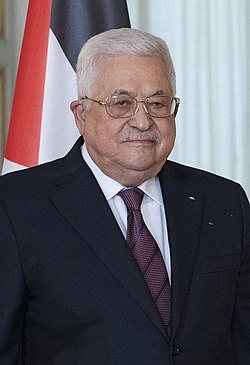| Chairman of the Executive Committee of the Palestine Liberation Organization | |
|---|---|
| |
| Executive Committee of the Palestine Liberation Organization | |
| Appointer | PLO Executive Committee |
| Inaugural holder | Ahmad Shukeiri |
| Formation | 24 May 1964 |
 |
|---|
Officeholders whose status is disputed are shown in italics |
| |
The Chairman of the Palestine Liberation Organization, officially the Chairman of the Executive Committee of the Palestine Liberation Organization, is the leader of the Executive Committee (EC) of the Palestine Liberation Organization (PLO), the executive body of the PLO, which was established in 1964. The Chairman represents the PLO and the Palestinian people before the international community, including the United Nations. The Chairman is chosen by the members of the PLO EC. [1] Since 29 October 2004, Mahmoud Abbas has been the Chairman of the PLO EC.






